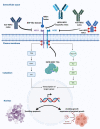Neuregulin 1 Gene (NRG1). A Potentially New Targetable Alteration for the Treatment of Lung Cancer
- PMID: 34680187
- PMCID: PMC8534274
- DOI: 10.3390/cancers13205038
Neuregulin 1 Gene (NRG1). A Potentially New Targetable Alteration for the Treatment of Lung Cancer
Abstract
Oncogenic gene fusions are hybrid genes that result from structural DNA rearrangements, leading to unregulated cell proliferation by different mechanisms in a wide variety of cancer. This has led to the development of directed therapies to antagonize a variety of mechanisms that lead to cell growth or proliferation. Multiple oncogene fusions are currently targeted in lung cancer treatment, such as those involving ALK, RET, NTRK and ROS1 among many others. Neuregulin (NRG) gene fusion has been described in the development of normal tissue as well as in a variety of diseases, such as schizophrenia, Hirschsprung's disease, atrial fibrillation and, most recently, the development of various types of solid tumors, such as renal, gastric, pancreatic, breast, colorectal and, more recently, lung cancer. The mechanism for this is that the NRG1 chimeric ligand leads to aberrant activation of ERBB2 signaling via PI3K-AKT and MAPK cellular cascades, leading to cell division and proliferation. Details regarding the incidence of these gene rearrangements are lacking. Limited case reports and case series have evaluated their clinicopathologic features and prognostic significance in the lung cancer population. Taking this into account, NRG1 could become a targetable alteration in selected patients. This review highlights how the knowledge of new molecular mechanisms of NRG1 fusion may help in gaining new insights into the molecular status of lung cancer patients and unveil a novel targetable molecular marker.
Keywords: NRG1 fusion; lung cancer; resistance to therapy; target therapy.
Conflict of interest statement
L.E.R.: Receives research support from MERUS, BMS, Roche, Genentech, Pfizer, Lilly Oncology, AstraZeneca, Merck, Syndax, Loxo, Guardant and Liquid Genomics. D.R.: Declares no conflict of interest. A.R.: Reports personal fees for attending advisory boards with AstraZeneca, MSD and Novartis. C.R.: Reports grants for Lung Cancer Research Foundation–Pfizer grant 2019 NHI U54 grant (project co-leader). He has received personal fees for attending advisory boards with IBMS, Novartis, Boston Pharmaceuticals, BluePrint and Esai. Fee for speaking bureau: MSD, AstraZeneca and Roche. Non-financial conflict includes a research collaboration with Guardant Health.
Figures
References
-
- Laskin J., Liu S., Tolba K., Heining C., Schlenk R., Cheema P., Cadranel J., Jones M., Drilon A., Cseh A., et al. NRG1 fusion-driven tumors: Biology, detection, and the therapeutic role of afatinib and other ErbB-targeting agents. Ann. Oncol. 2020;31:1693–1703. doi: 10.1016/j.annonc.2020.08.2335. - DOI - PMC - PubMed
Publication types
LinkOut - more resources
Full Text Sources
Research Materials
Miscellaneous


